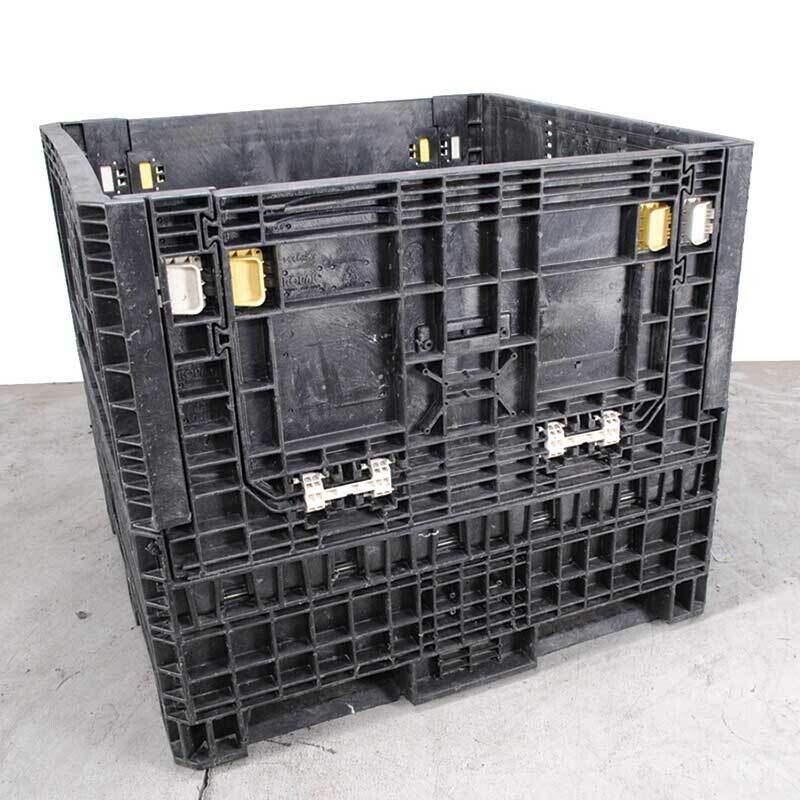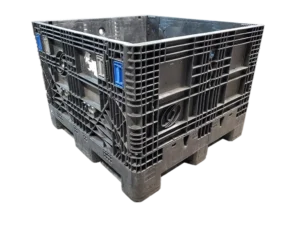Simplify logistics with used collapsible containers for better operations
The Ultimate Guide to Picking the Right Mass Containers for Your Company Demands
Choosing the appropriate bulk containers is vital for any business that depends on effective logistics. Different kinds of containers exist, each developed for particular products and applications. Variables such as size, material compatibility, and regulatory standards play a significant duty in this decision-making procedure. Understanding these components can result in boosted operational effectiveness. Numerous companies overlook crucial aspects that might enhance their total effectiveness and sustainability. What are these considerations?
Recognizing Various Sorts Of Bulk Containers
Bulk containers work as necessary tools for companies looking for efficient storage and transportation options. These containers come in numerous kinds, each made to satisfy details operational demands. One typical kind is the intermediate mass container (IBC), which is optimal for granulated and fluid products, offering an equilibrium of ability and ability to move. One more popular choice is the bulk bag, or FIBC, ideal for dry, flowable products. These adaptable containers are lightweight and can be quickly transferred and saved. For much heavier materials, stiff mass containers are frequently used, giving durability and security for risk-free handling. In addition, there are specific containers customized for dangerous products, making sure conformity with safety and security regulations. Recognizing the unique characteristics of these bulk container kinds enables organizations to make informed decisions that enhance logistics and lower prices. By picking the ideal container, firms can improve their functional effectiveness and simplify their supply chain processes.
Secret Product Factors To Consider for Mass Containers
When selecting mass containers, it is necessary to contemplate the products utilized in their construction. Aspects such as resilience, chemical, and strength compatibility play an essential function in making sure the containers satisfy certain functional needs. In addition, weight and transportability worries can influence both effectiveness and transportation logistics.
Material Resilience and Stamina
Toughness and stamina are vital variables in choosing materials for mass containers, as they straight affect the container's ability to stand up to different environmental problems and dealing with processes. Products such as high-density polyethylene (HDPE), polypropylene, and stainless-steel are commonly favored for their robust residential properties, supplying resistance to abrasion, effect, and temperature level changes. The selection of material also influences the total lifespan of the container; stronger materials commonly cause much less regular replacements, leading to cost savings with time. In addition, the weight of the product can affect shipping expenses and simplicity of handling. Services should consider their certain functional environments and the capacity for wear and tear to guarantee peak longevity and stamina in their bulk container selection.
Chemical Compatibility Aspects
Comprehending chemical compatibility is necessary for picking bulk containers, as the products utilized need to resist the particular substances they will hold. Various variables influence compatibility, consisting of the chemical nature of the materials, temperature level, and period of storage. Harsh chemicals might require containers made from stainless steel or specialized plastics that withstand destruction. Additionally, responsive compounds can generate warm or gases, requiring aired vent or pressure-rated containers. The option of container product, whether polycarbonate, polyethylene, or steel, ought to align with the chemical properties of the stored materials to avoid leaks or breaches. Eventually, a complete assessment of these compatibility aspects assures risk-free handling and storage, protecting both workers and the setting while keeping item integrity.
Weight and Portability Concerns
Choosing bulk containers includes not only reviewing chemical compatibility but also taking into consideration weight and transportability. Businesses need to assess the convenience of handling and transportation to maximize effectiveness. Lightweight products like high-density polyethylene (HDPE) or light weight aluminum can help with simpler movement and minimize shipping expenses. Conversely, larger containers might give improved durability but can hinder mobility, especially in environments requiring regular moving. Additionally, the style of the container must permit convenient training and piling, making sure ergonomic safety for workers. Companies need to also think about the facilities offered for transport; for instance, containers compatible with forklifts or pallet jacks can improve procedures. Eventually, the appropriate equilibrium in between weight and portability straight influences operational efficiency and expense performance.
Sizing Your Mass Containers for Ideal Effectiveness
When sizing mass containers, businesses must carefully evaluate the dimensions needed to fit their details items. Furthermore, weight ability is a crucial factor that influences performance and safety and security during transport and storage. Efficient sizing not just optimizes area but additionally enhances functional process.
Identifying Container Capacities
Picking the right measurements for mass containers is crucial for making best use of effectiveness in storage and transport. Services must analyze their specific needs, considering variables such as offered area, the nature of the items being saved, and the approaches of transportation utilized. Precise dimensions guarantee that containers fit ideally in storage facilities and cars, minimizing lost space and decreasing dealing with time. Requirement dimensions can provide comfort, yet customized measurements might be required for one-of-a-kind demands or to fit details items. In addition, it is crucial to assess stacking capabilities and accessibility, as these elements influence total functional efficiency. Inevitably, the appropriate measurements bring about boosted company and streamlined logistics, benefiting the overall performance of business.
Weight Capacity Considerations
Recognizing weight capacity is important for services aiming to enhance their bulk container effectiveness. The weight ability of a container straight influences storage abilities, transportation logistics, and overall functional prices. Selecting containers with the proper weight limitations ensures click site that businesses can safely keep and deliver their items without taking the chance of damages or compliance problems. Overloading containers can bring about architectural failures, while underutilizing capability outcomes in lost sources. When choosing containers, it is vital for organizations to assess their product weights and consider any regulative demands. Furthermore, elements such as the kind of material, intended use, and ecological conditions need to additionally affect weight ability choices. By assessing these components, businesses can boost effectiveness and assure a streamlined supply chain.
Regulatory Compliance and Safety And Security Requirements

Regulative conformity and safety requirements play an essential function in the selection of mass containers for companies. Organizations should guarantee that their containers satisfy various laws established by neighborhood, nationwide, and global authorities. These standards commonly pertain to material safety, structural honesty, and correct labeling, which assist prevent accidents and ensure the safe transport of products.
In addition, adherence to industry-specific guidelines, such as those from the Food and Medicine Administration (FDA) or the Occupational Safety And Security and Wellness Administration (OSHA), is crucial for companies handling harmful products or food. Non-compliance can result in penalties, legal issues, or damages to a business's credibility.
Companies need to also consider the container's compatibility with the materials being kept or moved to avoid contamination or chemical click here to read reactions (used plastic containers). To sum up, recognizing and carrying out regulatory conformity and safety and security requirements is vital for the efficient and liable use of mass containers
Sustainability Options for Eco-Friendly Bulk Containers

Firms are also discovering options made from recycled products, which not just conserve resources however also support the reusing market. Developments in design permit for lighter containers that require much less energy to transportation, additionally improving sustainability. By incorporating these eco-friendly bulk container choices, organizations can show their dedication to environmental stewardship while satisfying consumer need for sustainable techniques. This shift not only assists the world yet can additionally enhance brand credibility and client commitment.
Cost-Effectiveness and Budgeting for Mass Containers
While numerous companies focus on sustainability, cost-effectiveness continues to be an important factor when choosing mass containers. Organizations needs to assess the first acquisition cost, in addition to long-lasting operational costs, to assure financial feasibility. Aspects such as reusability, resilience, and maintenance play a considerable duty in identifying overall expenditures.
Purchasing premium containers might produce greater in advance expenses however can bring about cost savings with lowered substitute prices and decreased waste. Additionally, organizations must think about transportation prices and storage space efficiency, as these can influence the overall budget plan.

Regularly Asked Inquiries
Exactly how Do I Establish the Right Container for Hazardous Products?
To determine the appropriate container for dangerous materials, one have to assess compatibility with the compound, think about the container's product, check for governing compliance, and evaluate ability and security attributes to guarantee appropriate handling and storage space.
Can Bulk Containers Be Personalized for Certain Products?
Yes, bulk containers can be tailored for specific products. used bulk containers. Different features, such as layout, dimension, and material, can be tailored to fulfill unique requirements, ensuring suitable safety and security and efficiency for moving and storing various items
What Is the Average Life-span of Different Bulk Container Kind?
The typical lifespan of mass container types differs; plastic containers last 5-10 years, view website steel containers 10-20 years, and wood containers typically last 3-7 years, depending upon usage, upkeep, and environmental conditions.
Exactly how Should I Clean and Maintain Mass Containers?
To clean and maintain bulk containers, one should consistently inspect for damages, remove deposit, laundry with ideal detergents, wash extensively, and assurance appropriate drying prior to storage space. Complying with producer guidelines improves durability and safety and security throughout use.
Are There Rental Choices for Mass Containers Available?
Yes, numerous companies use rental choices for bulk containers, providing flexibility for businesses. These rentals can accommodate numerous needs, allowing firms to handle supply effectively without the dedication of purchasing containers outright.
Toughness and strength are important elements in picking materials for bulk containers, as they directly affect the container's ability to hold up against various ecological conditions and managing processes. Comprehending chemical compatibility is essential for choosing mass containers, as the materials utilized must resist the specific materials they will hold. Comprehending weight ability is vital for companies intending to maximize their mass container efficiency. Governing conformity and safety requirements play a crucial duty in the choice of mass containers for businesses. While lots of services focus on sustainability, cost-effectiveness remains a critical factor when picking bulk containers.